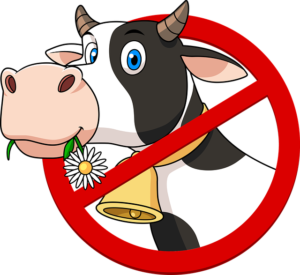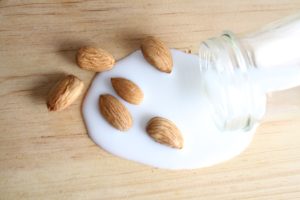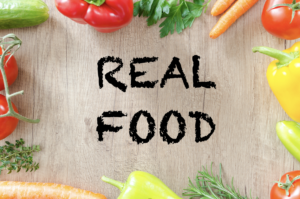Milk…it does a body good, right?!
Or does it?
A lot of controversy has arisen regarding cow’s milk and our health. What exactly are these health concerns? Are plant milks better and, if so, which ones?
Zonya and I worked long and hard to sort fact from fiction, which is often fueled by different interest groups on both sides of the arguments (such as the dairy industry on one side and animal rights groups on the other). Strap on your seatbelts, because there’s a lot to cover here!
Let’s start with cow’s milk.
Of all the milk options, cow’s milk contains the most nutrients including protein, calcium, magnesium and potassium (and it’s the lowest cost). We have been told for years we need calcium to keep our bones strong and prevent osteoporosis. While the link between calcium and bone health has been questioned in recent years, it still appears to be an important part of our diet…and dairy products have one of the highest concentrations per serving of highly absorbable calcium. Milk is also fortified with vitamin D, which helps the body absorb and use calcium and is important for the health of our bones and teeth, and its potassium content helps manage blood pressure, as demonstrated in the “proven to reduce blood pressure” DASH diet studies.
And skim milk offers this wonderful nutrition with a mere 5 mg of cholesterol and zero saturated fat…all for only 12 cents per cup — now, that’s a nutritional bargain!
However, there are some things to consider…
Allergic to dairy?
 When consuming milk and milk products, some people may have increased mucus production, resulting in chronic ear and sinus infections. They can live for years with this unknown, low grade allergy-creating ongoing autoimmune response and “inflammation” in their bodies, requiring frequent rounds of antibiotics (which are, of course, detrimental for several reasons). Unfortunately, because many doctors defer to pills as the first treatment option, people who could benefit from simply avoiding dairy are often prescribed antibiotics instead.
When consuming milk and milk products, some people may have increased mucus production, resulting in chronic ear and sinus infections. They can live for years with this unknown, low grade allergy-creating ongoing autoimmune response and “inflammation” in their bodies, requiring frequent rounds of antibiotics (which are, of course, detrimental for several reasons). Unfortunately, because many doctors defer to pills as the first treatment option, people who could benefit from simply avoiding dairy are often prescribed antibiotics instead.
Lactose intolerant?
For other people, the response to dairy is gastrointestinal. It may be surprising to learn 30 to 50 million Americans are lactose intolerant (in other words, bring on the gas!), and as much as 65% of the population has a reduced ability to digest lactose after infancy. If either of these are you, or anyone in your family, you should consider opting for plant-based milks.
Other risks?
Some studies have associated consumption of dairy products with increased risk of prostate cancer, type 1 diabetes in children (when exposed to dairy below one year of age), and acne in adolescence (especially when combined with the typical Western diet and its abundance of processed foods). There is also the subject of the naturally-occurring hormones present in milk as well as the synthetic rBGH that is sometimes used to increase milk production (often resulting in infection and requiring more antibiotic treatment for the animals). These issues contribute to the question of whether milk is playing a role in our ever growing problem of antibiotic resistance.
These issues and risks are part of the reason why plant-based milk alternatives have become increasingly popular. Not to mention the numerous studies supporting the disease-preventative benefits of a “plant-based diet”, where anti-oxidant rich foods and gentler digesting plant protein replaces cholesterol and animal protein.
What are the alternatives to cow’s milk?
- REAL FOOD. Most importantly, the nutrients that milk are so well-known for can be obtained from REAL food! It is possible to get all the calcium you need without dairy, by trading your “3-a- day” of dairy for “3-a-day” of dark leafy greens (especially kale and collard greens), yogurt (even though this is dairy, some lactose-intolerant people can tolerate yogurt…plus, the probiotics are beneficial), beans and legumes, salmon and broccoli…just to name a few. So, if you focus on a balanced diet of REAL food, (even without any dairy), you can get the calcium, potassium and protein you need.
- Plant-based milks. There are many options, each with their own unique taste, texture and nutritional profile. Be careful because many of these milks contain a lot of sweeteners and other additives, which can affect their “healthy status.” Many also contain “gums” for “mouth feel.” For instance, many commercial plant-based milks contain a thickener called carrageenan, which can cause digestive problems and inflammation in some people, therefore joining the growing list of additives many people wish to avoid.
 Almond milk. While a popular milk replacement that we use often, keep in mind that one cup of almond milk contains only 1 gram of protein (there is as little as 4 almonds per cup of commercial almond milk). And, if you buy vanilla, it has almost 4 tsp of sugar per cup. The cost is about 41 cents per cup. Even though almond milk is low in protein (which is true for all plant-based milks except for soy milk), it is not a concern as long as you are eating an adequate diet. Simply adding nuts to your morning oatmeal provides a great source of protein, keeping you feeling full and providing a level blood sugar until lunchtime.
Almond milk. While a popular milk replacement that we use often, keep in mind that one cup of almond milk contains only 1 gram of protein (there is as little as 4 almonds per cup of commercial almond milk). And, if you buy vanilla, it has almost 4 tsp of sugar per cup. The cost is about 41 cents per cup. Even though almond milk is low in protein (which is true for all plant-based milks except for soy milk), it is not a concern as long as you are eating an adequate diet. Simply adding nuts to your morning oatmeal provides a great source of protein, keeping you feeling full and providing a level blood sugar until lunchtime.
Cashew milk. Similar to almond milk, but notably creamier and richer, cashew milk makes a great coffee creamer alternative. One cup of unsweetened cashew milk only has 25 calories, 2 grams of fat, and 0 grams of saturated fat.
 Soy milk. For years, soy milk has led the way as the ideal milk alternative. Soy milk is made from soaking, grinding, and boiling soybeans with water. With a comparable protein content, beneficial phyto-estrogens (to combat menopausal symptoms) and, if supplemented with calcium, soy milk makes for a comparable alternative to cow’s milk, although the price is higher.
Soy milk. For years, soy milk has led the way as the ideal milk alternative. Soy milk is made from soaking, grinding, and boiling soybeans with water. With a comparable protein content, beneficial phyto-estrogens (to combat menopausal symptoms) and, if supplemented with calcium, soy milk makes for a comparable alternative to cow’s milk, although the price is higher.
Internet concerns about soy being bad for the thyroid and its photo-estrogens negatively affecting certain types of breast cancer have not been supported by science to date. In some studies, the opposite has been found to be true. Soy milk deserves a chance because other studies indicate soy milk may:
- Normalize development in girls
- Reduce breast cancer risk
- Decrease prostate cancer risk in men
- Protect against osteoarthrosis
- Improve gut health by promoting the growth of good bacteria
- In one recent study, just two cups a day was found to drop bad cholesterol 25% in only 21 days!
Keep in mind, soybeans are highly genetically-modified, but organic soy milk (made from organic and non-GMO soybeans) is now easy to find.
Rice milk. This is the most allergy-friendly milk and has been a favored option for those with soy or nut allergies. However, a serious downside has been discovered, and that is the high levels of arsenic found in rice milk. Arsenic is associated with developmental effects, cardiovascular disease, neurotoxicity, cancer, skin lesions, and diabetes. It’s so serious, the European and American Societies for Pediatric Nutrition recommend the avoidance of rice milk for infants and young children. If you are allergic to soy or nut milks, coconut or hemp milk are your best choices.
 Coconut milk. This one is a little more confusing. There is coconut water…a trendy drink made from liquid inside the coconut…you can drink it, but don’t confuse it when milk is called for! Coconut milk is creamy and rich. It is higher in saturated fat, but this includes lauric acid, which many argue is a heart-healthy saturated fat that improves HDL. This remains a controversial area, as the World Health Organization and American Heart Association continue to maintain that all saturated fats promote heart disease. We feel coconut milk is a REAL food that can have a place in moderation. Canned coconut milk should be used in small amounts: 1 cup can contain 445 calories, 48 grams of total fat, 43 grams of saturated fat, and 5 grams of protein. Keep in mind, coconut milk can be thick or thin…canned coconut milk is thicker and often used for cooking curry and Thai dishes…be sure to shake the can before opening! Thinner coconut milk is made for drinking and is typically found by the other alternative milks in the store.
Coconut milk. This one is a little more confusing. There is coconut water…a trendy drink made from liquid inside the coconut…you can drink it, but don’t confuse it when milk is called for! Coconut milk is creamy and rich. It is higher in saturated fat, but this includes lauric acid, which many argue is a heart-healthy saturated fat that improves HDL. This remains a controversial area, as the World Health Organization and American Heart Association continue to maintain that all saturated fats promote heart disease. We feel coconut milk is a REAL food that can have a place in moderation. Canned coconut milk should be used in small amounts: 1 cup can contain 445 calories, 48 grams of total fat, 43 grams of saturated fat, and 5 grams of protein. Keep in mind, coconut milk can be thick or thin…canned coconut milk is thicker and often used for cooking curry and Thai dishes…be sure to shake the can before opening! Thinner coconut milk is made for drinking and is typically found by the other alternative milks in the store.
Hemp seed milk. One of the newer alternative milks, many people like it because of its thicker and creamier texture. In case you were wondering, it is made from the seeds of the hemp plant, which is legal to grow in various countries around the world. The chemical THC found in marijuana is NOT present in hemp milk! A 1 cup serving of unsweetened hemp milk contains 70 calories, 5 grams of total fat, 4.5 grams of unsaturated fat, 2 grams of carbohydrates, and 3 grams of protein. It is a source of vitamins A, D, E and B-12, along with calcium and magnesium. In addition, it has the ideal ratio of omega-3 to omega-6 fats (3:1), which are vital for brain function, and normal growth and development.
So, what does all this mean?
Because each person is unique, it all comes down to taste preferences, health goals, and budget concerns.
Here is where we are at (at least for the moment):
- Get calcium and other important nutrients from REAL food…don’t rely solely on milk.
- One to two cups of milk (skim or 1%) per day is perfectly healthy…beyond that, the benefits are unclear and there may be some risk.
- Periodically use plant-based milks, especially in cooking. For example, we use coconut milk for Indian and Thai dishes. We also like the texture of almond milk in dishes like Creamy Kale and Swiss Chard.
- Give organic soy milk a chance, as its protein and isoflavones are highly beneficial.
- Watch the sugar content in “original” and “vanilla” almond and soy milks, just as you would in chocolate and other flavored milks.
- Try your hand at homemade almond milk…specifically, our Homemade Strawberry Almond Milk!
So, whatever choices you make, dairy or not, just remember…
get out of the box and focus on REAL food!



Really good article about a complicated subject! I appreciate all the info (pros and cons), and the extra links for more info. Good to know about getting calcium and protein from a well-balanced real food diet – sounds like what my mom used to tell me about eating my veggies!
Great article explaining the different types of milk and their uses. Great alert also to calorie content of each!
Thank you so much for the feedback! So glad this helps!
I enjoyed reading about all the different types of milk. My question is, Does Almond milk spoil once opened, or can you still rely on the Use By date. I like the flavor, but don’t seem to use it as fast as regular milk.
Great question! Yes, almond milk can spoil once it is opened. If you store your opened almond milk in the fridge, it should last for 7-10 days. We have found it helpful to write the date we open it on the container. If it goes bad, you may notice a sour / pungent odor or it may not taste quite right. It can also get thick and clumpy when it goes bad. If you make your own almond milk, it may not last quite as long (maybe up to 3-5 days). Thanks for the great question!
I was told by someone that the fat in milk and other dairy products helps our bones receive and absorb the calcium, so we therefore should not use fat-free dairy if we are concerned about preventing osteoporosis. Have you ever heard this and what is your opinion?
Good question Beverly.
While there are important fats to include in our diet, it appears best left to monounsaturated fats like avocadoes, nuts, seeds and olive oil. This article by Harvard sums it up well, that there just isn’t the data to support that claim. I hope this helps!
https://www.health.harvard.edu/staying-healthy/is-low-fat-or-full-fat-the-better-choice-for-dairy-products
Thank you!